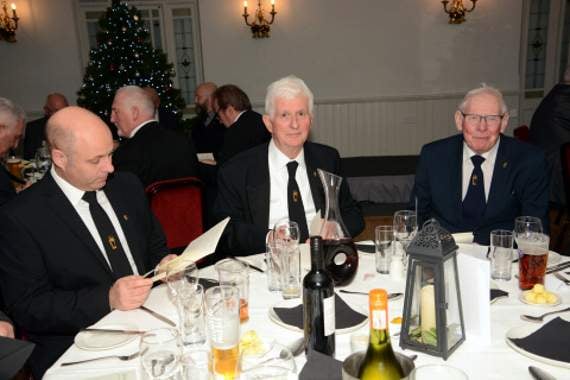AN ancient society in which members clubbed together to save them from the stigma of a pauper’s grave has celebrated its 175th anniversary, writes Colin Gregory.
Members of the Bude Haven Philanthropic Society, known locally as the Bude Death Club, gathered for a traditional beef dinner at the Falcon Hotel, where it was formed in 1845.
Dressed in dark suits and wearing the death club tie, featuring a coffin, the 2020 diners were reminded that their predecessors in those early days struggled to live and support their families at a time before Bude was a town and just a very busy port known as Bede Haven, with some 600 inhabitants and 200 vessels registered at the Harbour Master’s office.
Life was hard and short, said present president Terry Bale, with male life expectancy just 40 years, 43 for a woman.
Most men were employed in the trades generated by the vessels. Wages were between nine and 11 shillings a week and people were often unable to save any money for emergencies and pay their funeral expenses.
Mr Bale said: “A parish burial — known as a pauper’s grave — was a huge stigma for a family.”
Families often asked local businesses for money to help them bury their dead.
One man, George Brendon the first, decided to launch a friendly society at his Falcon Hotel alongside the harbour. George and his family set up the Falcon Club on May 8, 1845, with members paying 6d a quarter at a dinner at the Falcon. The 6d entitled the member to a death benefit of £6 — a lot of money in those days.
All working men under 40 living within a mile of the Falcon Hotel were invited to become members with both the man and his wife having their funeral expenses covered.
A member had to pay every quarter, and if they missed a second payment they were removed from membership.
From 1845 to 1900 the death benefit remained at £6, with quarterly and annual dinners of boiled beef and carrots, a tasty treat for the impoverished working man, held at the Falcon Hotel, but after the turn of the century the society started having dinners at the Globe Hotel and once at the Bude Masonic Lodge with no reasons recorded. An actuary sorted out the accounts every five years and predicted how many members would die in the following five.
From 1905 it was called the Bude Haven Philanthropic Society, with members paying two shillings and six pence a year.
In January 1945 it was decided to hold an annual dinner at the Globe Hotel, with George Brendon the second presiding. One of the original rules read out was that the meal was to cost no more than 1s6d, including a pint of ale. The menu shows a meal of roast goose with all the trimmings. By 1975 the death benefit had increased to £21, with £14 paid in the case of a wife’s passing.
The Ministry of Pensions intervened in 1990 and the society found that several expensive changes had to be made to come into line with the new Financial Services Act so it went into dissolution in September, 1991, and the funds distributed among the members.
A new body, named the Bude Death Club, was formed in 1993 with a new constitution. What would have been the 150th anniversary was celebrated at the Globe Hotel after which a special tie was designed showing a coffin, and this has to be worn at the dinners. The club, with around 120 members, has a sound financial position and the present treasurer is Harry Wellington. The president, Terry Bale, has filled various posts over 50 years while vice presidents Brian Cook, the chairman Nigel Simmons and committee member Mike Hicks have all been in position for over 30 years.
Mr Bale said: “It is good to be back at the Falcon with the Brendon family.”
He thanked Rupert Brendon, owner and direct descendant of the first George Brendon, and who had donated a bottle of port for each table. At midnight, after some hearty comedy entertainment, the diners all gathered outside the hotel to sing the traditional carol While Shepherds Watched.
No recorded minutes have survived from the early days but some of the cash accounts still exist. The first death benefit paid was to Mr N Davey on the death of his wife in September 1845. He received the sum of £1 3s 9d.
An interesting item appearing in the expense account of each committee meeting was 1s 3d for six pints of ale.
By 1880, a year when six members had died and their widows had been paid £6 each, the Falcon Club had funds of £91, with most of it deposited in the Post Office Bank, after outgoings totalling £91 0s 6d, including £1 a year salary paid to the treasurer.
Today’s members pay a very small annual subscription of £5, get no death benefits, and hold the annual dinner to celebrate the past.
Most of the members are mainly concerned in maintaining a Bude tradition and are anxious to keep their club in existence.





Comments
This article has no comments yet. Be the first to leave a comment.